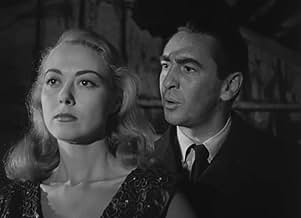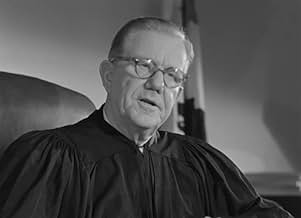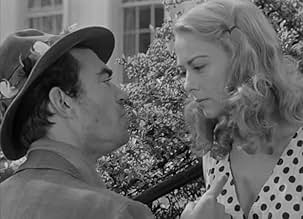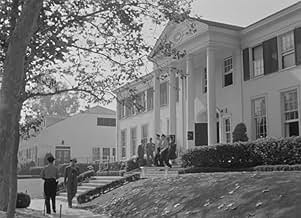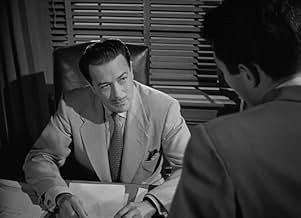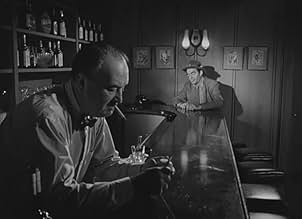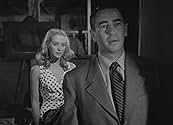Lawyer defends migrant worker falsely accused of two murders.Lawyer defends migrant worker falsely accused of two murders.Lawyer defends migrant worker falsely accused of two murders.
Frank Baker
- Court Stenographer
- (uncredited)
Marshall Bradford
- Coroner
- (uncredited)
Ralph Brooks
- Courtroom Photographer
- (uncredited)
Benny Burt
- Citizen
- (uncredited)
Jack Carr
- Angry Citizen
- (uncredited)
Robert Carson
- Jury Foreman
- (uncredited)
Ralph Dumke
- Bartender
- (uncredited)
Richard Emory
- Reporter
- (uncredited)
Featured reviews
Count the Hours (AKA: Every Minute Counts) is directed by Don Siegel and written by Karen DeWolf and Doane R. Hoag. It stars Macdonald Carey, Teresa Wright, John Craven, Jack Elam, Dolores Moran, Adele Mara and Edgar Barrier. Music is by Louis Forbes and cinematography by John Alton.
When a farmer and his housekeeper are murdered, suspicion falls on the hired hand George Braden (Craven). Owning a gun that matches the bullets used in the killings, Braden and his wife Ellen (Wright) are taken in for questioning when Ellen panics and is seen to throw the weapon into a lake. Under pressure and wanting to free his wife from duress, Braden confesses to the crime and finds himself on trial for his life. Enter Doug Maddison (Carey), a local lawyer who comes to believe that Braden is innocent and faces a fight against the clock to save Braden from the hangman's noose.
The pairing of Don Siegel and John Alton alerts the noir crowd to this compact low budget race against the clock thriller. In truth it's standard fare on a plot basis, with a mixed bag of acting performances (Elam and Wright exempt) and poor use of the Theramin in the musical score (it telegraphs what we should expect and feels on this occasion it's in the wrong movie), but within simplicity of story also comes potent points of worth.
As the clock ticks down and the stakes are raised, Siegel and the writers slot in the distasteful workings of the human being. Not only is there the running theme of the law quite frankly being an ass, but there is the bite of the rumour mill, a man forcing himself on to a desperate woman (Siegel zooms in for an emphasised facial shot that is bone chilling) and psychiatry playing a judicial hand; and not a good one at that!
Then there is Alton bringing his photographic tricks to compliment Siegel's efforts to lift a standard screenplay to greater things. Angular shots feature but it's with shadows and light that Alton excels, none more so than with the prison sequences. Here is where a frantic Braden is being held and it is a caged hell, because Alton highlights the shadows from the bars on the doors and windows as well, there is no escape from bars, they literally are all around, with one shot showing Alton at his best.
It's little seen and most likely forgotten about, and certainly its qualities have been ignored by the none film noir loving crowd, yet this is well worth a peek for those film lovers who like trawling the back alleyways for Siegel and Alton peccadilloes. 7.5/10
When a farmer and his housekeeper are murdered, suspicion falls on the hired hand George Braden (Craven). Owning a gun that matches the bullets used in the killings, Braden and his wife Ellen (Wright) are taken in for questioning when Ellen panics and is seen to throw the weapon into a lake. Under pressure and wanting to free his wife from duress, Braden confesses to the crime and finds himself on trial for his life. Enter Doug Maddison (Carey), a local lawyer who comes to believe that Braden is innocent and faces a fight against the clock to save Braden from the hangman's noose.
The pairing of Don Siegel and John Alton alerts the noir crowd to this compact low budget race against the clock thriller. In truth it's standard fare on a plot basis, with a mixed bag of acting performances (Elam and Wright exempt) and poor use of the Theramin in the musical score (it telegraphs what we should expect and feels on this occasion it's in the wrong movie), but within simplicity of story also comes potent points of worth.
As the clock ticks down and the stakes are raised, Siegel and the writers slot in the distasteful workings of the human being. Not only is there the running theme of the law quite frankly being an ass, but there is the bite of the rumour mill, a man forcing himself on to a desperate woman (Siegel zooms in for an emphasised facial shot that is bone chilling) and psychiatry playing a judicial hand; and not a good one at that!
Then there is Alton bringing his photographic tricks to compliment Siegel's efforts to lift a standard screenplay to greater things. Angular shots feature but it's with shadows and light that Alton excels, none more so than with the prison sequences. Here is where a frantic Braden is being held and it is a caged hell, because Alton highlights the shadows from the bars on the doors and windows as well, there is no escape from bars, they literally are all around, with one shot showing Alton at his best.
It's little seen and most likely forgotten about, and certainly its qualities have been ignored by the none film noir loving crowd, yet this is well worth a peek for those film lovers who like trawling the back alleyways for Siegel and Alton peccadilloes. 7.5/10
This is far from the best Don Siegel movie. But, despite flaws in writing and acting, it's gripping and moves along, keeping the viewer on the edge of his or her seat.
Nothing is really credible. Theresa Wright as an itinerant farmer's wife? Actors with pronounced New York accents as menacing rednecks? And something about the script seems truly sub-par. The dialogue is not grammatical and this is not a matter of simulating regional speech or signifying class. The dialogue is just not well written.
The music, too, is strangely self-contradictory. At first it is pure schmalz, and Don Siegel is not the man for romance, even if it's romantic noir. Then a theramon is introduced and it sounds better.
Despite quibbling on my part, it's an engrossing movie. Believable? Not exactly. But, if one cuts it some considerable slack, it works well as a suspenseful kind-of noir.
Nothing is really credible. Theresa Wright as an itinerant farmer's wife? Actors with pronounced New York accents as menacing rednecks? And something about the script seems truly sub-par. The dialogue is not grammatical and this is not a matter of simulating regional speech or signifying class. The dialogue is just not well written.
The music, too, is strangely self-contradictory. At first it is pure schmalz, and Don Siegel is not the man for romance, even if it's romantic noir. Then a theramon is introduced and it sounds better.
Despite quibbling on my part, it's an engrossing movie. Believable? Not exactly. But, if one cuts it some considerable slack, it works well as a suspenseful kind-of noir.
MacDonald Carey stars as a public defender taking on the case of a migrant farm worker accused of killing his employer in this unusual RKO production. Directed stylishly by Don Siegel and marvelously photographed by the great John Alton, whose penchant for deep, angular shots is on display throughout, Count the Hours has plenty of the ingredients you'd expect a noir classic to feature. Sadly, it's let down by a drab screenplay by Karen Dewolf and a dull, Lon Chaney Jr.-style performance by John Craven as the falsely accused handy man. The film also suffers from a Louis Forbes score that features an overdone theremin theme whenever the real villain appears on the screen. Count the Hours looks great and also features good performances by Teresa Wright (in a role that seems tailor made for Patricia Neal) and Jack Elam, but on balance, it remains a frustrating though watchable failure.
A lawyer defends a migrant worker falsely accused of two murders.
What is interesting, first of all, is how the defendant is described as a "migrant worker". That is not incorrect, but I think perhaps the connotation in 1953 is different than in 2017, because now the term would almost exclusively be referring to a Latino employee. In fact, the United Nations defines a migrant worker as "a person who is engaged or has been engaged in a remunerated activity in a State of which he or she is not a national." This, more often than not, would be Mexican farmhands in the case of the United States.
Anyway, the film is quite good. I don't know if it was a feature or a B-movie, as it does give the impression of not having big names attached and perhaps a smaller budget. But for entertainment purposes and a but of suspense, it does the job. In retrospect, it also serves as a great example of early work from director Don Siegel.
What is interesting, first of all, is how the defendant is described as a "migrant worker". That is not incorrect, but I think perhaps the connotation in 1953 is different than in 2017, because now the term would almost exclusively be referring to a Latino employee. In fact, the United Nations defines a migrant worker as "a person who is engaged or has been engaged in a remunerated activity in a State of which he or she is not a national." This, more often than not, would be Mexican farmhands in the case of the United States.
Anyway, the film is quite good. I don't know if it was a feature or a B-movie, as it does give the impression of not having big names attached and perhaps a smaller budget. But for entertainment purposes and a but of suspense, it does the job. In retrospect, it also serves as a great example of early work from director Don Siegel.
Despite the economical running time, very much more of this unexceptional movie may well have felt like counting the hours as the finale approached.
Opening as a spine tingling creepshow, rapidly followed by gunfire and a double murder, 'Count the Hours' soon settles upon a pedestrian plateau as John Craven desperately pleads innocent of any crime, his case seriously damaged when panic stricken wife, Teresa Wright disposes of his gun in a nearby lake. The ensuing, protracted courtroom scene does little to reignite the adrenaline levels.
Sceptical, inexperienced lawyer, MacDonald Carey, is initially unwilling to take the case, until he spots Wright risking life and limb, repeatedly diving as she attempts to retrieve the gun. Carey is also confronted by the prevailing small town ethos (even evident amongst all the fun and games of My Cousin Vinny) in which everybody knows everybody else and nobody knows anybody who would ever do anything to hurt anyone.....Does that make sense? Therefore, Craven and Wright tick all the boxes as drifters, out- of- towners, new kids on the block, who simply MUST be guilty!
It's all rapidly rolling into the realms of rigmarole, until a much needed shot in the arm arrives in the form of loopy local loony, Jack Elam and his kooky, money grabbing, gold digging moll, Adele Mara. A femme fatale failure, whose feminine wiles fall foul of the unpredictable Elam and the reputable Carey.
'Count the Hours' has its moments, it's worth the time, but hardly the film noir fireball it promises to be at the start. Elam and Mara largely steal the show, well supported by the endearingly sincere, guilt ridden Wright. In contrast, neither Carey nor Craven radiate any significant on screen charisma, while Dolores Moran is serviceable as the bride to be. The movie always struggles to maintain momentum following its Wham-Bam-Thankyou-Mam launch. Perhaps it's just a bit too obvious, right down to Elam's name in the opening credits. Could you REALLY imagine him as a doting, favourite uncle, or the kindly family doctor?
Opening as a spine tingling creepshow, rapidly followed by gunfire and a double murder, 'Count the Hours' soon settles upon a pedestrian plateau as John Craven desperately pleads innocent of any crime, his case seriously damaged when panic stricken wife, Teresa Wright disposes of his gun in a nearby lake. The ensuing, protracted courtroom scene does little to reignite the adrenaline levels.
Sceptical, inexperienced lawyer, MacDonald Carey, is initially unwilling to take the case, until he spots Wright risking life and limb, repeatedly diving as she attempts to retrieve the gun. Carey is also confronted by the prevailing small town ethos (even evident amongst all the fun and games of My Cousin Vinny) in which everybody knows everybody else and nobody knows anybody who would ever do anything to hurt anyone.....Does that make sense? Therefore, Craven and Wright tick all the boxes as drifters, out- of- towners, new kids on the block, who simply MUST be guilty!
It's all rapidly rolling into the realms of rigmarole, until a much needed shot in the arm arrives in the form of loopy local loony, Jack Elam and his kooky, money grabbing, gold digging moll, Adele Mara. A femme fatale failure, whose feminine wiles fall foul of the unpredictable Elam and the reputable Carey.
'Count the Hours' has its moments, it's worth the time, but hardly the film noir fireball it promises to be at the start. Elam and Mara largely steal the show, well supported by the endearingly sincere, guilt ridden Wright. In contrast, neither Carey nor Craven radiate any significant on screen charisma, while Dolores Moran is serviceable as the bride to be. The movie always struggles to maintain momentum following its Wham-Bam-Thankyou-Mam launch. Perhaps it's just a bit too obvious, right down to Elam's name in the opening credits. Could you REALLY imagine him as a doting, favourite uncle, or the kindly family doctor?
Did you know
- TriviaAfter Director of Photography John Alton agreed to shoot this movie, he asked Producer Benedict Bogeaus how much he had budgeted for rigging - the system of overhead pipes, brackets, ropes, and cables that suspend lights over a film set. Bogeaus told him four thousand dollars. "Give me two thousand dollars above my salary and I won't use any rigging," said Alton. He did it by using almost no overhead lighting at all, contributing to the film's rich visual atmosphere.
- GoofsThe screen shows a newspaper article stating that George Braden is about to go on trial for the murder of Fred Morgan. However, two people were killed, so both names should have been given.
- ConnectionsReferenced in Mau Mau Sex Sex (2001)
Details
- Runtime1 hour 16 minutes
- Color
- Aspect ratio
- 1.37 : 1
Contribute to this page
Suggest an edit or add missing content


